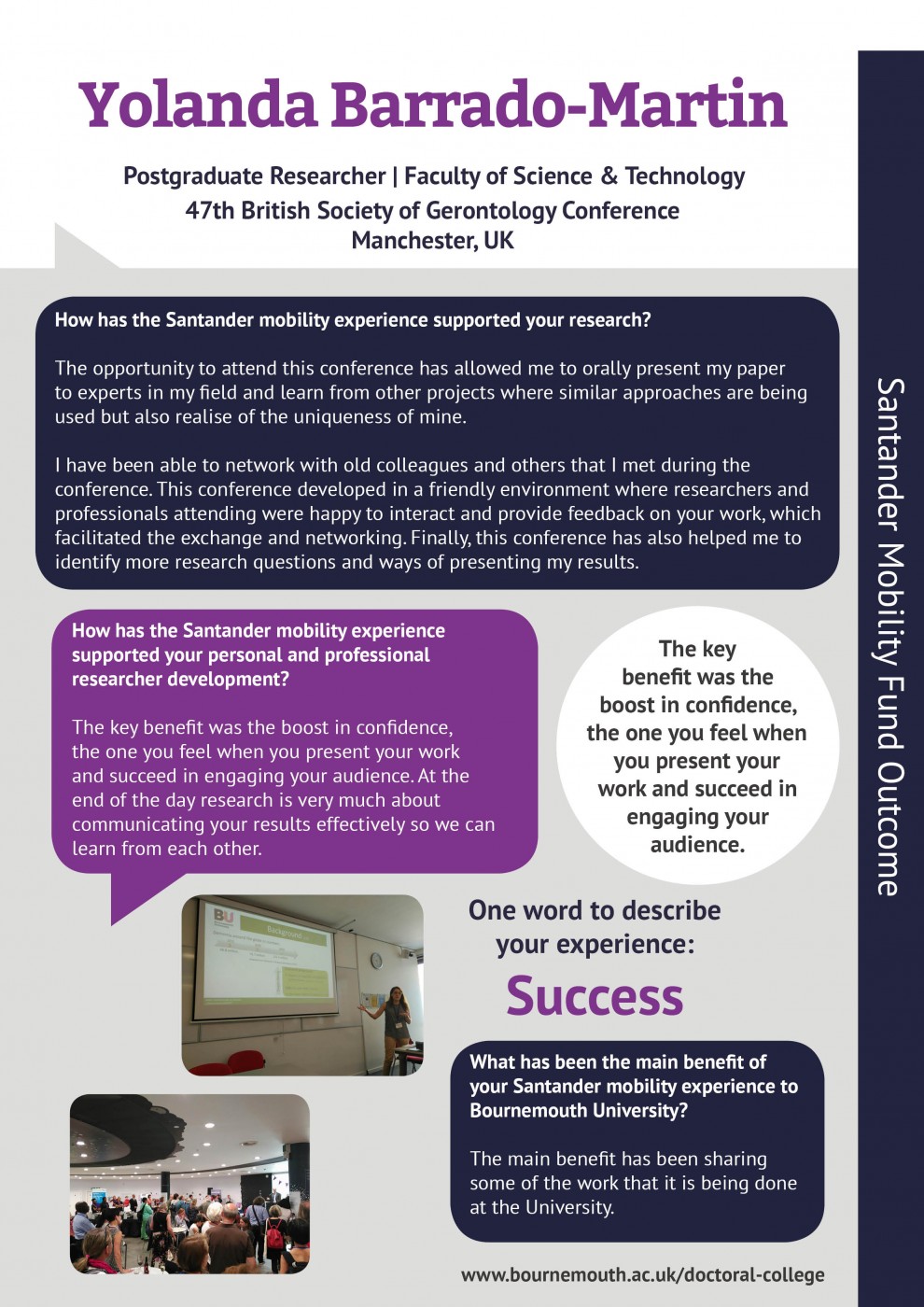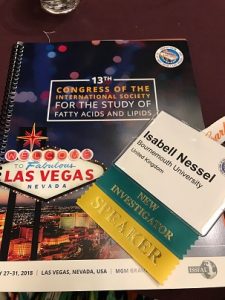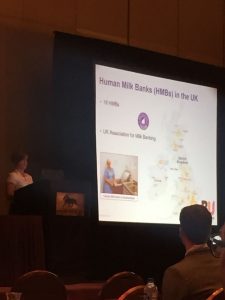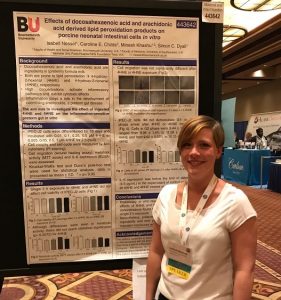
Doctoral College Santander Mobility Awards | Yolanda Barrado-Martin Awardee Report

Latest research and knowledge exchange news at Bournemouth University


The International Society for the Study of Fatty Acids and Lipids (ISSFAL) www.ISSFAL.org held its 13th International Congress in Las Vegas, Nevada, USA at the end of May. After a very informative Satellite Symposium (Arachidonic and docosahexaenoic acids in infant development), the Congress started with a welcome reception in the Tropicana Hotel. This was not only well attended by the approximately 500 delegates from all over the world, but also Elvis Presley and Frank Sinatra made an appearance.
The following 3 days were packed with excellent and informative sessions about General Nutrition, Maternal and Infant Nutrition, Inflammation and Allergy, Clinical Trials  Methodology and Ketoneurotherapeutics. In between, well-known researchers in the field presented their research in plenary talks. Dr Michael Crawford obtained an omega-3 research award and Dr Maria Makrides was awarded with the Alexander Leaf Award. Her presentation entitled “Standing on the shoulders of giants: great women role models, mentors and advocates” was really inspiring.
Methodology and Ketoneurotherapeutics. In between, well-known researchers in the field presented their research in plenary talks. Dr Michael Crawford obtained an omega-3 research award and Dr Maria Makrides was awarded with the Alexander Leaf Award. Her presentation entitled “Standing on the shoulders of giants: great women role models, mentors and advocates” was really inspiring.
I would like to thank ISSFAL for the opportunity to present my PhD research. My presentation was entitled “Optimising LCPUFA content of donor human milk: A review of current milk banking practices and recommendations for improvement”, presenting the results of our UK Milk Bank survey, which is now extended internationally. Furthermore, I had two posters displaying our work on preterm formula milk storage conditions and lipid degradation; and the effects of lipid degradation products on intestinal cells in vitro. These presentations gave me the possibility to position myself in the fatty acid research world and to make valuable contacts.
banking practices and recommendations for improvement”, presenting the results of our UK Milk Bank survey, which is now extended internationally. Furthermore, I had two posters displaying our work on preterm formula milk storage conditions and lipid degradation; and the effects of lipid degradation products on intestinal cells in vitro. These presentations gave me the possibility to position myself in the fatty acid research world and to make valuable contacts.
ISSFAL was especially taking care of us New Investigators, providing New Investigator Awards, organising a New Investigator social at the Mob Museum for networking with other researchers at a similar stage, as well as organising a meet the professor breakfast to talk to the experts in the field. One of the none scientific highlights was of course our trip to the Grand Canyon on the free day.
I would also like to thank my supervisors Dr Simon Dyall and Prof Minesh Khashu for their ongoing support as well as Gillian Weaver and Dr Caroline Childs for the fantastic collaborations. Furthermore, I would like to thank Bournemouth University and Santander for making this trip possible.
If you would like to learn more about our research, please feel free to contact me at inessel@bournemouth.ac.uk
Isabell

I have recently returned from an amazing opportunity to go to Scotland and attend the Nursing, Midwifery and Allied Health Professionals Research unit (NMAHP-RU) at Stirling University for two days. I landed at 2200 at Edinburgh airport and was lucky enough to have a fantastic taxi driver that acted as tour guide on the 40 minute drive from the airport to Stirling University pointing out Stirling castle, Edinburgh Bridge and the kelpies monument that was lit beautifully against the dark skyline. I was staying at Stirling Management Centre which is onsite at Stirling University.
Day One
My first day on the 17th was a beautifully sunny and hot one. I had a meeting with Dr Helen Cheyne of the NMAHP-RU who is involved in decision making research, with interests and paper’s on interventions in labour, identifying labour and intrapartum care assessment to name but a few. The meeting was informal and involved a lovely walk around campus which is extremely large with its own woodland area and lake; home to beautiful wildlife. We discussed my study as well as the related work she had done in the field followed by a history of Scotland’s maternity care services and current practices around discussing place of birth. Overall a thoroughly thought provoking and useful meeting, Helen also put me in touch with a fellow Phd student with interests in my study topic who I have been in contact with. We then attended the Research Unit which was large and open planned where I met all of her colleagues, some of which I had meetings with.
Following lunch my second meeting was with Dr Julie Cowie a researcher interested in complex interventions, ehealth and mixed methodologies all related to my study. We sat outside and made use of the glorious sunshine whilst discussing my choice of methods and how to choose the most appropriate decision analysis framework. Again I received a lot of helpful advice and information to support my study, making the meeting an extremely valuable one.
Then came the time to give my presentation; the moment that I had been dreading since I knew I was going on this trip. Luckily everyone had been extremely welcoming and kind and my fears had subsided slightly. The presentation had gone as well as I could have hoped and what followed was a great discussion that yielded useful points to consider. Unfortunately technology wasn’t on my side and the link to the decision support tool wouldn’t open ….. Luckily enough my supervisors had warned me from their previous experience that this could happen and I had taken screen shots to input into the presentation so a massive crisis was averted! The high of the presentation ended my first day at the research unit, I returned to the hotel elated. I made use of their fantastic gym facilities and Olympic size swimming pool!
Day two
Yet another beautifully warm and bright day (I joke not) consisted of further meetings. The first with Dr Purva Abhyankar an expert in the field of decision making and the use / implementation of decision aids within health related settings. She has had numerous publications in the decision aid field and has a wealth of knowledge to access, providing me with a list of area’s to read into and books to further my knowledge. Followed by a meeting with Dr Pat Hoddinott who is a former GP and has a particular interest in the design and delivery of complex interventions such as a decision support tool to support health behaviours around childbirth, we discussed at length my chosen methodology with possibilities of adding some new ideas such as the ‘think out loud’ technique. I left the meetings with my head swimming with new knowledge and a new boost of excitement, ideas to research and consider.
Overall
Walking back to the hotel that afternoon I felt a sense of achievement, I had my first travel experience on my own without have a meltdown, I completed my first presentation to peers that new nothing of my study and left with some encouraging comments and a sense that my knowledge level had doubled with all of their expert advice and suggestions. Overall this was a thoroughly enjoyable, thought provoking and memorable trip with not a cloud or drop of rain in sight.
I would like to thank the NMAHP-RU and all those that took the time out of their busy schedules to meet with me and again to Santander for the funding to make this trip possible.
I had the privilege to visit St Thomas’ hospital on the 15th April, having been invited to attend their lunchtime seminar and to do some networking. Being so close to London waterloo I enjoyed a gentle walk along Tower Bridge on what was such a beautifully warm and sunny day. Walking up to St Thomas’ was a poignant moment for me, working in Queen Alexandra which is a large and very new hospital in Cosham, I always feel like a small cog in a big machine. But looking from the bottom of the path, St Thomas’ was even larger, with its 12 floors dominating the immediate skyline.
Upon Arrival
My nerves that had been brewing were quickly dissipated by the warm welcome and introductions by Dr Kirstie Coxon, a research fellow whose research and Ph.D. looked at maternal choice regarding place of birth with regards to risk perception, this directly relates to my own doctoral study that Is assessing a decision support app created by Portsmouth Hospital NHS trust to support decision making and information gathering relating to choice of birthplace. I had previously had the opportunity to meet with Kirstie after she visited Portsmouth where we discussed relevant literature related to choice of place of birth.
Kirstie took me around the Women’s Health Academic Centre, home to many research fellows and research midwives conducting several research projects in the area of women’s health. I was introduced to her colleague’s and happily began sharing our different research passions and projects.
The Seminar
This week’s seminar was regarding post-traumatic stress disorder and the incidence of intimate partner violence in pregnancy presented by a third year Ph.D. student based in Mexico over in London for 6 months to present the findings of the research so far.
The seminar was informal involving other Ph.D. students, research midwives, fellows and the professor of midwifery. I felt extremely grateful to be invited into the seminar and involved in the discussion. I felt slightly anxious at the thought that I would be in this position at different points in my research study and I actively took notes for hints and tips on presenting.
The research was extremely interesting and provoked various discussions within the group such as how to identify intimate partner violence in pregnancy but more importantly how we can help those individuals identified. Following the seminar I had an opportunity to meet with Professor Jane Sandall who enthusiastically listened to my proposed research study giving me her years of experience and some avenues to think about perusing relating to my doctoral study such as possibly involving partners within the interview process. Taking to Jane about methodologies and how my Doctoral study will link with work already produced in the field confirmed my excitement in the project.
Following this I was introduced to Jenny Carter a research midwife who was involved in the preeclampsia study related to antihypertensive use to reduce stillbirths and neonatal deaths, she has just begun the process of a Ph.D. and we discussed our relevant areas of studies and methodologies.
The afternoon was finished by Kirstie showing me round their home from home birth centre and their obstetric centre, which was fairly similar to QA in setting however St Thomas’s provides women with amazing views across the Thames to sights that included the London eye, a major selling point to induce calm and serenity.
Final Thoughts
Overall a thoroughly enjoyable, extremely enlightening and thought provoking trip; It gave me a greater understanding of the other areas of research under the umbrella term of women’s health and it also gave me further avenues to consider for my own research. I would like to thank all those at the Women’s health academic centre for making me feel so welcome and also Santander for awarding me the funding to make the visit possible.
 Congratulations to Simon Ferneyhough, second year PhD student in Psychology (SciTech), for obtaining funding from both the Santander Mobility Award scheme (£1000) and the British Psychological Society Postgraduate Study Visit scheme (£400). In combination, these funds will be used to support a two week research placement at the University of the Balearic Islands, working with long-standing laboratory collaborator and newly appointed Visiting Professor in Psychology, Dr. Fabrice Parmentier.
Congratulations to Simon Ferneyhough, second year PhD student in Psychology (SciTech), for obtaining funding from both the Santander Mobility Award scheme (£1000) and the British Psychological Society Postgraduate Study Visit scheme (£400). In combination, these funds will be used to support a two week research placement at the University of the Balearic Islands, working with long-standing laboratory collaborator and newly appointed Visiting Professor in Psychology, Dr. Fabrice Parmentier.
Si mon’s PhD research examines the impact of normal cognitive ageing on a specific aspect of working memory performance known as feature binding: the ability to integrate different features of objects and events (e.g., colour, shape, sound, location) into unified episodic representations. While existing research indicates that we will all face decline in feature binding performance as we get older, not all types of feature binding seem to decline equally – memory for objects in locations, for instance, appears to be particularly impaired; while memory for an object’s intrinsic features (such as colour and shape) appears to be relatively preserved. Simon will use the visit to collaboratively develop a paradigm widely used in the auditory distraction literature to study auditory-spatial feature binding (that between a sound object and its location in space) across younger and older adult samples.
mon’s PhD research examines the impact of normal cognitive ageing on a specific aspect of working memory performance known as feature binding: the ability to integrate different features of objects and events (e.g., colour, shape, sound, location) into unified episodic representations. While existing research indicates that we will all face decline in feature binding performance as we get older, not all types of feature binding seem to decline equally – memory for objects in locations, for instance, appears to be particularly impaired; while memory for an object’s intrinsic features (such as colour and shape) appears to be relatively preserved. Simon will use the visit to collaboratively develop a paradigm widely used in the auditory distraction literature to study auditory-spatial feature binding (that between a sound object and its location in space) across younger and older adult samples.
Simon’s PhD is supervised by Dr.Jane Elsley (Psychology) and Dr. Andrew Johnson (Psychology).